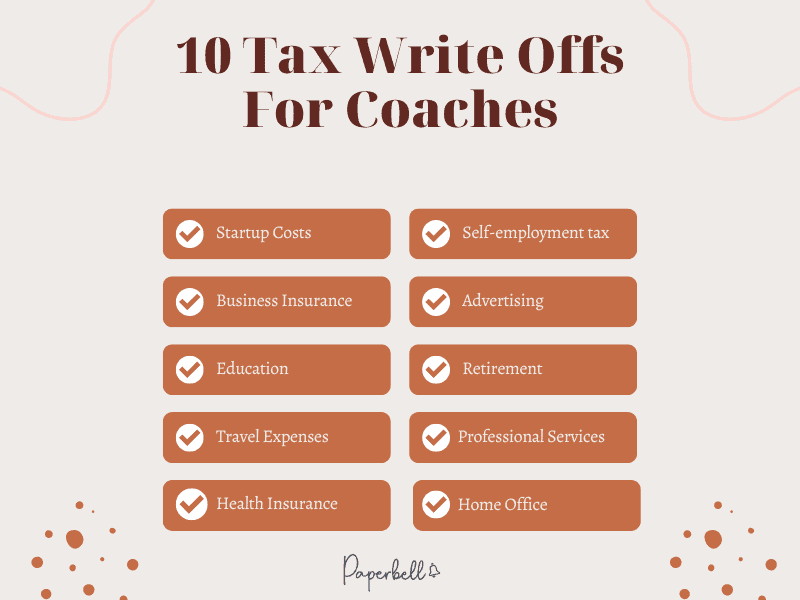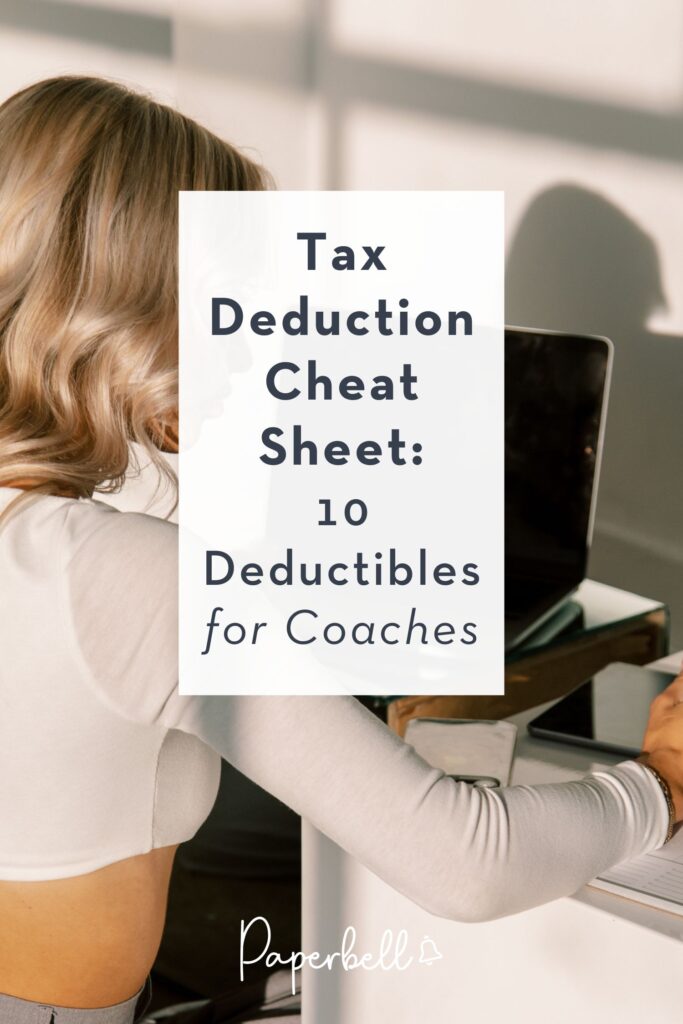Not sure what you can write off as a coach?
Filing taxes probably isn’t your favorite time of year, but this checklist might just change that. Discover these ten lesser-known deductions coaches qualify for in the US so you can keep more money in your business.
Disclaimer: This article is for informational purposes only and does not constitute tax, legal, or accounting advice. Please consult a professional for guidance specific to your situation.
First, What’s a Tax Deduction?
A tax deduction (also called a write-off) is a business expense that lowers the amount of income you pay tax on.
As a coach, you have to pay income tax on what your business earns, both at the federal level and, depending on where you live, at the state level too.
But here’s the good news: You’re only taxed on your profit, not your total income. So if you made $20,000 in your first year but spent $18,000 getting your business off the ground, you’ll only pay tax on the remaining $2,000.
Most of the tools, software, and services you use to run your coaching business can count as deductions. Keeping track of these can make a big difference when it’s time to file.
2 Types of Tax Deductions Coaches Need to Understand
When you file your taxes, you must choose between taking the standard deduction and itemizing your deductions. Here’s what that means for your coaching business.
1. Standard Deduction
The standard deduction is a fixed amount you can subtract from your income before calculating how much tax you owe. It changes every year and depends on your filing status.
For the 2024 tax year (the return you file in 2025), the standard deduction amounts are:
| Filing status | 2024 standard deduction |
| Single | $14,600 |
| Married, filing separately | $14,600 |
| Married, filing jointly; widow/er | $29,200 |
| Head of household | $21,900 |
If you choose the standard deduction, you won’t itemize your expenses, but it’s a quick and simple option if your eligible expenses don’t add up to more than these amounts.
2. Itemized Deductions
Itemizing means listing all the deductible expenses you’ve tracked throughout the year. As a self-employed coach, these may include:
- Office expenses and supplies
- Software subscriptions (yes, your Paperbell subscription counts!)
- Website hosting and domain fees
- Legal or professional services (like bookkeeping or tax advice)
- A portion of your rent and utilities if you work from a home office
- Business phone costs if you use a separate line
Let’s say you made $90,000 last year and tracked $10,000 in business-related expenses. If you itemize, you’ll only be taxed on $80,000 of income, not the full $90,000.
Now compare that to the standard deduction. If you’re filing as single and only had $10,000 in deductible expenses, you’d save more by taking the $14,600 standard deduction instead.

10 Little-Known Categories of Tax Write-Off for Self-Employed Coaches
Many coaches don’t realize these expenses are tax-deductible. Let’s look at some common write-offs that could help you keep more of your coaching income in your pocket.
1. Coaching Business Startup Costs
Just launched your coaching business? Good news: Many of your initial expenses may be deductible as startup costs.
The IRS allows you to deduct up to $5,000 in startup expenses and $5,000 in organizational costs in your first year, but only if your total startup spending is $50,000 or less.
If you spent more than $50,000, the deductible amount starts to phase out. And if your total startup costs exceed $55,000, the deduction is completely eliminated.
Typical startup costs for coaches might include:
- Equipment like a computer, microphone, or desk
- Logo design, a pitch deck, or other branding assets
- Initial website development
- Legal or consulting fees to set up your business
Important: Ongoing monthly expenses, like software subscriptions, advertising, or internet bills, generally don’t count as startup costs, even if they happen in your first year. Those are considered regular business expenses and can be deducted separately.
2. Self-Employment Tax
As a self-employed coach, you’re responsible for both the employer and employee portion of payroll taxes. This is called the self-employment tax and in 2024, the rate is:
- 12.4% for Social Security
- 2.9% for Medicare
The good news? You can deduct half of your self-employment tax when calculating your adjusted gross income (AGI). This doesn’t reduce your self-employment tax itself, but lowers your taxable income for federal income tax.
3. Business Insurance
Any insurance you carry specifically for your coaching business can be tax-deductible. For example:
- Professional liability insurance (also called errors and omissions insurance)
- General business insurance or property insurance for your office or equipment
- Cybersecurity insurance
If you eventually hire team members and offer benefits like employee health insurance, those premiums may also be deductible as a business expense.
4. Advertising and Marketing
Spending money to attract new clients? That’s generally deductible. Here are some common marketing expenses you can write off:
- Facebook or Google ads
- Website creation or redesign
- Logo or branding design
- Social media consultants or copywriters
- Printed materials like business cards or brochures
- Email marketing tools or CRM software
Basically, any money you spend promoting your coaching services typically counts as advertising expenses.
Keep in mind that just because it’s deductible doesn’t mean it’s a good investment. Make sure you test your offers before putting too much into ads.
5. Educational Content
As a coach, you can deduct expenses for educational content and training that directly help your business. This includes:
- Hiring a business coach or enrolling in a course related to coaching
- Taking courses that improve your skills and earn you qualifications relevant to your business (like coaching certifications)
- Books and other paid educational resources related to coaching or business management
However, personal hobbies or unrelated courses (like a pottery class) are not deductible unless they are connected to your business in some way.
Additionally, if you have a team member, like a virtual assistant, and you invest in training them for their work, you can also deduct those costs.
6. Contributions to Your Retirement Funds
Saving for retirement is not just smart, but it can also qualify as a tax deduction. Contributions to certain retirement accounts, like a SEP IRA or Solo 401(k), are typically deductible from your taxable income.
Keep in mind that you’ll pay taxes on these funds when you withdraw them in retirement, but you may be in a lower tax bracket at that time, potentially reducing your overall lifetime tax burden.
7. Business Travel Expenses
If you’re traveling for your coaching business, whether it’s to attend a conference, visit clients, or even conduct a retreat, many of your travel expenses can be deducted. Here are some deductible travel expenses:
- Plane tickets, gas, or vehicle expenses like car rental
- Hotel stays
- 50% of business meals
For the trip to count as a business expense, you must travel away from home overnight, and the trip must be primarily for business purposes.
8. Professional Services
If you hire professionals to help with your business, such as a tax advisor, lawyer, or accountant, those fees are deductible too. Remember to keep invoices and receipts from these professionals for your records, as they will be required if you’re ever audited.
9. Health Insurance and Medical Expenses
As a self-employed coach, you can deduct health insurance premiums for yourself, your spouse, and your dependents. This includes premiums for medical, dental, and long-term care insurance.
However, this doesn’t apply if you’re eligible for employer-sponsored health insurance, including through a spouse.
Additionally, medical expenses that exceed 7.5% of your adjusted gross income (AGI) may be deductible if you itemize. This can include doctor visits, prescription medications, and other qualified medical costs.
10. Home Office Deductions
If you operate your coaching business from home, you can qualify for home office deductions. You can deduct a portion of your rent or mortgage payments, utilities (such as electricity, internet, and water bills), and office supplies.
To qualify for this deduction, your home office must be used regularly and exclusively for business activities.
You can calculate the deduction either by using the simplified method (a flat rate of $5 per square foot, up to 300 square feet) or the actual expense method, where you prorate your expenses based on the percentage of your home used for business.
Make sure to keep records of all related expenses, including utility bills and office supply receipts, to support your claims.
Self-Employed Tax Deduction Cheat Sheet
Understanding which expenses you can deduct as a coach is crucial for maximizing your savings. Here’s a simple Self-Employed Tax Deduction Cheat Sheet you can get ideas from to lower your tax bill:
| Electric Vehicle Tax Credit | Purchasing a qualifying electric vehicle (subject to income limits, vehicle price caps, and manufacturing requirements). |
| Child Tax Credit | A credit of up to $2,000 per qualifying child under the age of 17. |
| Adoption Credit | Qualified expenses related to adopting a child. |
| Capital Losses | Losses from the sale of capital assets like stocks or property. |
| Charitable Contributions | Contributions made by self-employed individuals or their coaching businesses to qualified charities. |
| Startup Cost Deduction | Expenses incurred when starting a new business, like web design or registration fees. |
| Self-Employment Tax Deduction | A deduction of 50% of the self-employment tax (to avoid paying both the employer and employee portions of Social Security and Medicare taxes). |
| Business Insurance Deduction | Premiums paid on insurance policies used for business purposes. |
| Health Insurance Deduction | Premiums paid for health insurance for yourself and your family. |
| Advertising and Marketing Costs | Costs associated with advertising and marketing your coaching business. |
| Educational Expenses | Educational expenses directly tied to the coaching business (workshops, courses, or certifications). |
| Home Office Deduction | Expenses incurred by using part of your home exclusively for business, like mortgage payments or utilities. |
| Business Equipment Expenses | Business equipment purchased for your life coaching business, such as computers or cameras. |
Self-Employed Tax Filing and Deductions Glossary
Additionally, here’s a glossary to help you navigate terms around self-employed tax filing and deductions.
Above-the-line deductions: These are the deductions the IRS allows you to make on your annual gross income to reduce your taxable income.
Estimated taxes: As a self-employed coach or business owner, you can file quarterly taxes instead of paying in one lump sum. This is the estimated amount you’ll make each quarter.
HSA/FSA: Health savings accounts (HSAs) and flexible spending accounts (FSAs) are non-taxable spending accounts you can use to pay for healthcare expenses.
Federal income tax: A percentage of your taxable income you need to pay towards the federal level, regardless of which state you live in.
State income tax: A percentage of your taxable income you’ll need to pay toward your state. Not all states have a state tax.
Year-to-date taxable income: How much have you generated from the beginning of this year to date?
LLC: Short for Limited Liability Company, a business structure you can choose as a coach other than sole proprietorship.
Corporation: Corporations have a completely separate taxable entity from their owners or shareholders.
W-2 form: As a self-employed coach, you won’t receive a W-2 form. These forms are only for employees on a payroll. If you’ve done contract work for another business, you’ll receive earnings statements on a 1099-NEC form instead.
1099-NEC form: Used to report income from freelance or contract work; it’s the most common 1099 form, but others exist, so it’s important to understand which one applies to you.
FAQ
What Tax Deductions Can Self-Employed Life Coaches Claim?
Self-employed life coaches can claim deductions like business expenses, home office costs, and health insurance premiums. Refer to our tax deduction cheat sheet for a more extensive list.
What Is Self-Employment Tax Deduction?
Self-Employment Tax Deduction allows you to deduct the employer-equivalent portion of your self-employment tax, reducing your taxable income.
Can I Deduct My Health Insurance Premiums as a Life Coach?
Yes, self-employed life coaches can deduct health insurance premiums for themselves, their spouses, and dependents, provided they meet certain criteria.
Do I Need to Keep Receipts for Tax Deductions?
Yes, it’s important to keep receipts for all business-related expenses, including invoices, to ensure you can substantiate your deductions if audited.
Managing Your Business Made Simple
Staying on top of your taxes starts with staying organized. When your payments, client records, and appointments are scattered, filing taxes becomes a headache.
With Paperbell, everything is in one place: Client surveys and notes, contracts, payments, and bookings. No more digging through your inbox or spreadsheets come tax time.
Paperbell also runs your coaching website and the admin side of your business. Try it for free to see how it can transform your practice.
Disclaimer: This post is for informational purposes only and was not written by a tax professional. If you have any questions about tax regulations, please consult a tax professional.

Editor’s Note: This post was originally published in June 2023 and has since been updated for accuracy.









